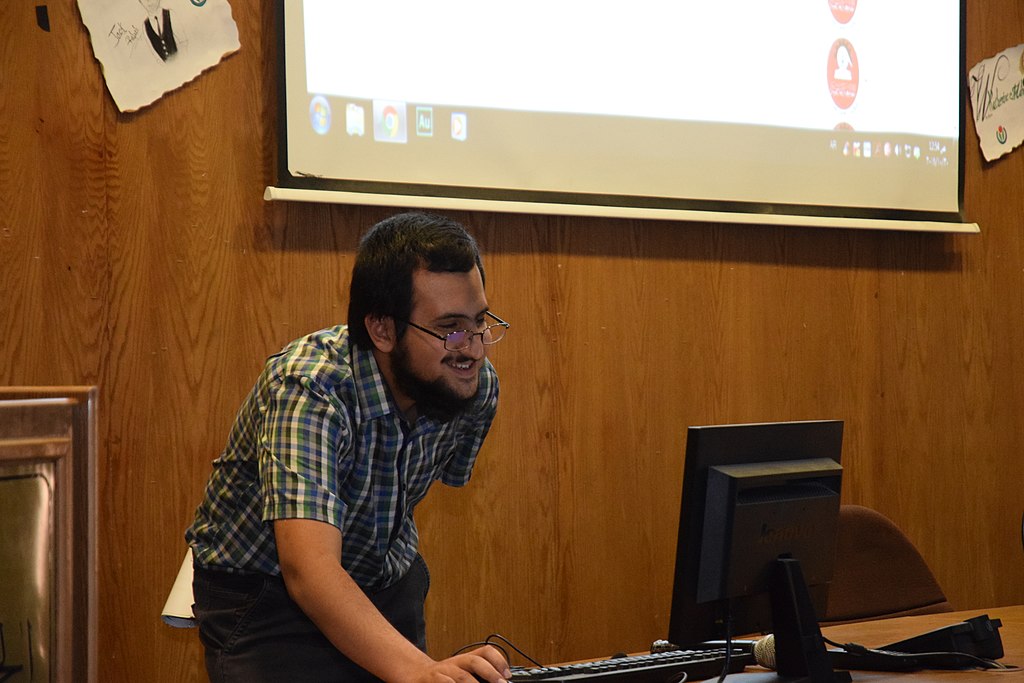Last month, the Wikimedia Foundation, Wikimedia community members in Jordan, and Hashemite University—one of the most esteemed higher education institutions in Jordan—signed a Memorandum of Understanding (MOU) to advance cultural cooperation and access to free knowledge resources in the Arabic language. It is the first MOU of its type signed with any university in the Middle East.
The partnership was announced at a roundtable discussion hosted at Hashemite University by Katherine Maher, Executive Director of the Wikimedia Foundation, and Professor Kamal Bani-Hani, Hashemite University President. They were joined by Hashemite University staff, students, the Wikimedians of the Levant User Group—the local Wikimedia community of volunteer editors—and other guests.
“This relationship with Hashemite University is a critical step in expanding Arabic language free knowledge resources on Wikipedia and on the broader internet. We’re proud to be working with the staff and students of this university to improve Wikipedia while enriching the academic experience of the students across the university,” said Maher.
Through the partnership, the University’s Arabic Online Content Club – Deanship of Student Affairs will create a standing Wikipedia office at the university to support greater collaboration between both institutions. The office will support students in learning how to contribute to the Wikimedia projects through training by local volunteers. The university will also designate a space in the library to host Wikipedia introductory materials for students and integrate Wikisource, the multilingual digital library of free texts, into the university library search engine. To support these efforts, the Wikimedia Foundation will donate a laptop to the university Wikipedia office.

“This MOU is the product of years of work,” said Mossab Banat, the originator of the MOU and a member of the Levant User Group, “and represents a quantum leap in the Wikipedia Education Program’s capabilities here at the university. We are excited at the potential that this formalized agreement will open for us.”
The Wikimedia projects have been used in educational settings from the inception of Wikipedia. University professors have found that teaching students how to contribute to Wikipedia and other Wikimedia projects is engaging and motivating for students, helping them to learn essential 21st century skills like media literacy, writing and research development, and critical thinking, while content gaps on Wikipedia are filled thanks to students’ efforts. Hashemite University has been supporting Wikimedia in education since 2015 in collaboration with local Wikimedia volunteers. Over 500 students participated in 12 courses in 2017, after Banat proposed the idea at a Deans’ council meeting, and by 2018, 54 students formalized a university club to focus on improving content on the Arabic Wikipedia.
“Our partnership has enables us to join a growing network of global educational facilities who are using the power of technology to facilitate access to more educational content,” said Prof. Kamal Bani-Hani, President, Hashemite University.
Wikipedia in Jordan is supported by a local community of volunteer editors as part of the Wikimedians of the Levant User Group. Together, volunteers from the user group write and improve articles primarily in Arabic and English Wikipedias and the other Wikimedia projects. Recognized as a formal Wikimedia affiliate in 2015, the Wikimedians of the Levant User Group regularly hosts events to teach more people how to edit Wikipedia and improve the representation of Arabic language content across the Wikimedia projects.
The relationship between the Wikimedia movement and the education sector is overseen by the Wikimedia Foundation in close collaboration with local Wikimedia volunteers around the world. The effort to bring Wikimedia into education has grown to involve programs in all parts of the world, at every education level, and using every Wikimedia project.

Can you help us translate this article?
In order for this article to reach as many people as possible we would like your help. Can you translate this article to get the message out?
Start translation